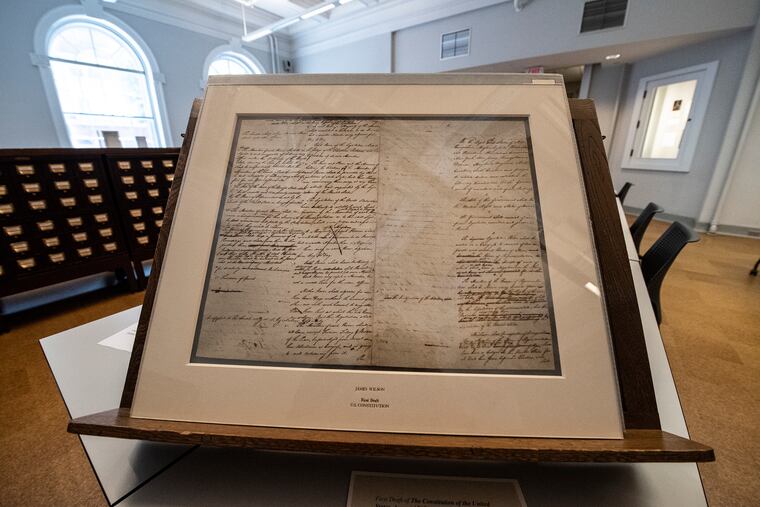On the anniversary of the 13th Amendment’s certification, remembering the nation’s ‘Second Founding’ | Opinion
Recognized as part of the Constitution on Dec. 18, 1865, the amendment banned slavery and was a moment when the nation came together to further expound the meaning of freedom, writes Elizabeth Wydra.

Most Americans know the Bill of Rights. But too few Americans know that the way we enjoy those crucial rights today is inextricably linked to the way our Constitution was transformed after the Civil War.
The first 10 amendments to the Constitution mark 10 early steps America took along what we at Constitutional Accountability Center call “the arc of constitutional progress.” Many people in the founding era opposed ratifying the Constitution’s original articles because they believed, as James Madison explained to the first Congress in 1789, it “did not contain effectual provision against encroachments on particular rights.” To remedy these objections, the Bill of Rights, Madison said, “expressly declare(s) the great rights of mankind secured under this constitution.”
Today, we know many of these rights by heart. Freedom of speech and press. Freedom from government establishment of religion and free exercise of religion. The right to be secure from unreasonable government searches and seizures. The rights to due process of law and against self-incrimination, and many others. In fact, the Ninth Amendment tells us the Bill of Rights isn’t exclusive, and that we, the people, have other rights not specifically mentioned in the Constitution.
As advanced as it was for its time, however, the Bill of Rights still fell critically short. It applied only to the actions of the federal government, allowing states to run roughshod over these rights. Even worse, these promised “great rights of mankind” stood in brutally stark contrast to the institution of slavery, ringing as “hollow mockery” in the face of the most fundamental deprivations of life and liberty.
» READ MORE: Reimagining the presidency: 3 constitutional revisions that might bring America back from the brink | Opinion
In the wake of the Civil War, however, African Americans, abolitionists, and other Americans joined together to further expound the meaning of freedom. The ratification of the 13th, 14th, and 15th amendments to the Constitution brought about what has been called a “Second Founding,” revolutionizing our governing charter to prohibit chattel slavery, promise citizenship to all born in America, offer equal protection under the law, and protect the right to vote from racial discrimination. That process began in earnest with the certification of the 13th amendment on Dec. 18, 1865.
America’s post-Civil War “Second Founders” updated the Bill of Rights in two ways.
First, they widened the umbrella of its majestic protections to cover everyone in America, to prevent state and local governments from violating our rights without fear of consequence. Most of the Supreme Court’s most celebrated rulings vindicating the rights set out in the Bill of Rights — cases such as New York Times v. Sullivan, Gideon v. Wainwright, and Miranda v. Arizona — are actually 14th Amendment cases. Without the 14th Amendment, states would be free to violate every single right listed in the Bill of Rights, as states in fact did to perpetuate the institution of slavery.
It is because of the effort of our Reconstruction framers that our fundamental rights are guaranteed no matter where in the United States you live. To be sure, the promise of the transformed Constitution has not always translated into a lived reality for far too many in this country. But there is power in the words generations of activists fought so hard to write into our national charter — we know what should be ours, and we demand change when constitutional promises are illusory.
» READ MORE: Constitution fetched stunning price at auction — as it should | Opinion
Second, the 14th Amendment expanded the meaning of freedom beyond the fundamental rights in the Bill of Rights. As my colleague, David Gans, the civil rights director at the Constitutional Accountability Center, has explained, the 14th Amendment’s “framers sought to safeguard fundamental rights that have no explicit textual basis in the Bill of Rights but that are crucial to equality and liberty.”
At the Second Founding, in fact, the framers of the 14th Amendment said, “It is the Declaration of Independence placed immutably and forever in our Constitution.”
The Bill of Rights, therefore, remains timeless and essential to our civic life. But it is just part of America’s struggle to become a “more perfect union.” As our ancestors taught us, that work is never finished. Through times of war and peace, and even pandemic, they showed us that America is best when the arc of our Constitution bends ever toward progress and liberation.
Elizabeth Wydra is president of Constitutional Accountability Center, a public interest law firm and think tank dedicated to promoting the promise of the Constitution’s text, history and values. This article originally appeared on InsideSources.com.